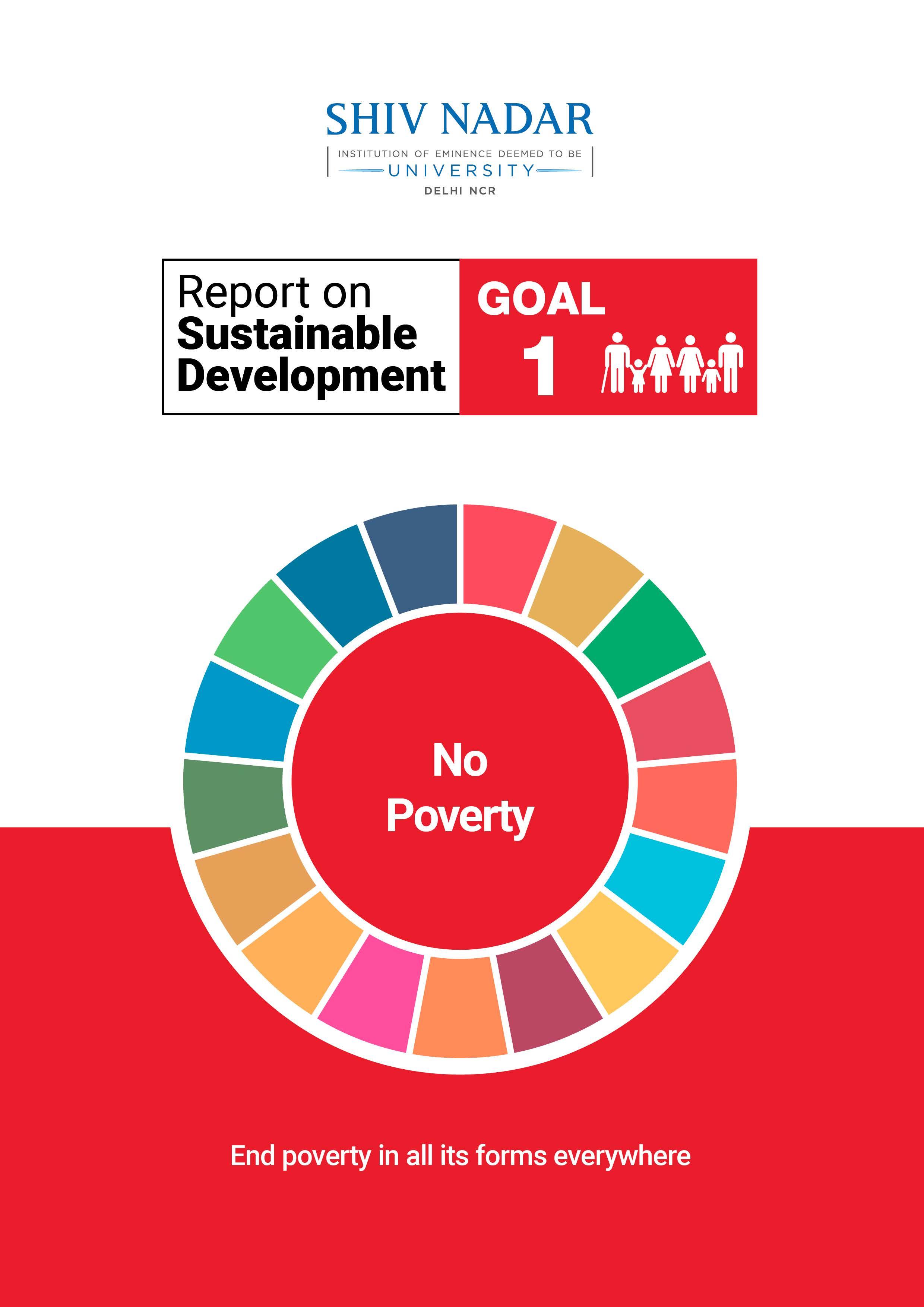

No Poverty

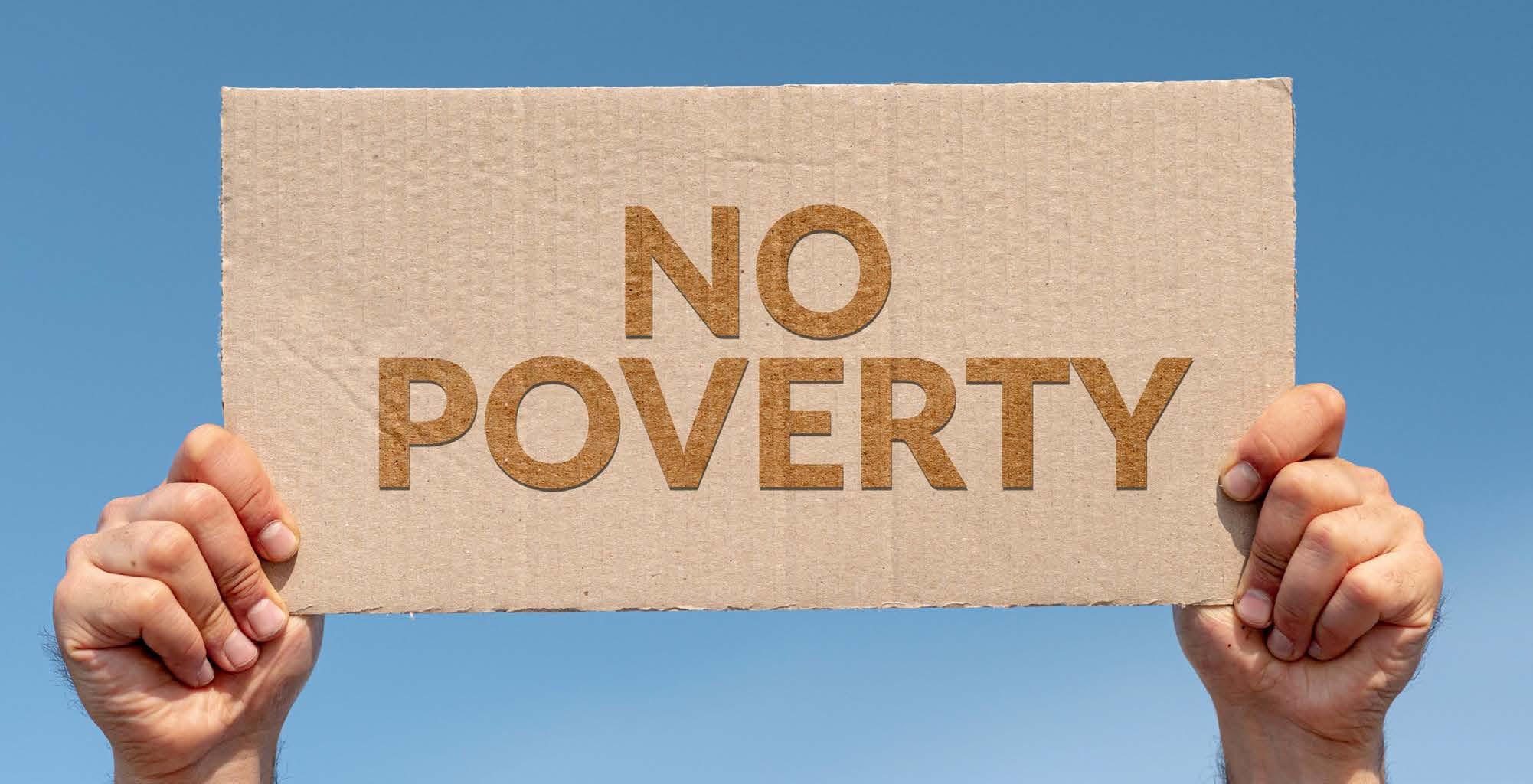
With seven targets and 14 indicators, Sustainable Development Goal 1 elucidates that no poverty means eradicating poverty in all forms, such that the poorest and the most vulnerable have equal access to economic and natural resources, services, and new technologies.
Higher education institutions are instrumental in fostering growth and reducing poverty through their position as employers and economic hubs. At Shiv Nadar University, we are advancing to SDG 1 through our work in teaching, research, institutional practices, and partnerships.
Here is a glimpse of our work.
TEACHING AND LEARNING
At the School of Humanities and Social Sciences, many departments offer courses for undergraduate and graduate students such as Poverty and Inequality (ECO 392), Economic Development (ECO 415), Interrogating Histories and Theories of Economic Development (INT 202), Problematizing Governance and Development (INT 603), Development Economics (ECO 605), Education for Sustainable Development (SWE 313), Development Economics (ECO 532), Growth and Inequality (ECO 425) and many more. Besides, we offer meaningful education around sustainability and related areas to all students across the university and core subjects. For undergraduate students, many compulsory courses
The test of our progress is not whether we add more to the abundance of those who have much; it is whether we provide enough for those who have too little.
Franklin D. Roosevelt
are regularly offered, such as Environmental Studies (CCC 704), Environmental Impact Assessment (CCC 406), Energy for Sustainable Future (CCC 614), Use of Energy in our Daily Life (CCC 624), and Green Energy Technologies (CCC 613), to name a few.
Manish Kumar, PhD Scholar in Sociology, receives IPN’s Small Grant.
Manish is a first-year PhD candidate in the Department of Sociology at Shiv Nadar University. He has received the Indian Pastoral Network Small Grant for his research project titled “Seasonal Migration Practice of Van Gujjars: Change and Continuities.”
Manish will use the grant resources to examine and contrast the Van Gujjars’ pastoral practices in two different ecological and sociopolitical contexts: A mountain pasture, where they spend the summer, and Bijnore, a plain area that serves as their new grazing grounds.
The Indian Pastoralist Network (IPN) is a collaborative platform dedicated to advancing research and advocacy related to pastoralism in India. It brings together researchers, practitioners,

and pastoralist communities to address pastoralists’ unique challenges and promote sustainable practices.
Carbon Markets affect marginalized communities.
Adithya Santhosh Kumar, a recent alumnus, published a piece on how carbon markets affect marginalized communities and turn indigenous farming practices into corporate profit, leaving communities empty-handed.
Exemplifying the university’s interdisciplinary aspirations, Adithya recently graduated with a major in Mechanical Engineering, with a minor in International Relations, and has a keen interest in sustainability.

From Shiv Nadar University to shaping impactful global development initiatives,
Raaga’s journey exemplifies commitment and purpose
S. Raaga Akkineni is a Research Analyst at the International Finance Corporation (World Bank Group). A graduate of Shiv Nadar University, in
the class of 2019, Raaga earned her bachelor’s in economics. After completing her Master’s from New York University, Raaga is today working in the area of evaluating the impact of development initiatives in varied socio-economic settings. She shared that her academics allowed her to bring a strong statistical approach to her work, ensuring that development projects are effective and evidence-driven.
Raaga is also involved with the World Bank Group Youth Summit, where she supports young leaders and entrepreneurs in addressing global development challenges through innovative ideas and solutions.

Social Sector Internship - Student Projects
Social Sector Internship is an eight-week rigorous and mandatory internship on real-life projects that provides our undergraduate students the context, empathy, and expertise to make decisions, keeping
No Poverty


in mind the triple bottom line involving people, planet, and profit, irrespective of the professional or entrepreneurial roles they assume in the future.
These opportunities generate new forms of knowledge where disciplinary barriers are dissolved; the divides between the scholar and the practitioner, the thinker and the doer, are overcome, and concrete societal benefits accompany the academic benefits of research.
The School of Management and Entrepreneurship students undergo this rigorous 8-week on-site internship immersion in rural and non-urban ecosystems, working with the local indigenous communities to ameliorate social enterprise challenges or create growth models for the social sector.
Some examples of these projects’ understanding and advancement of SDG 1 are: (We can add a box here with these examples.)
Mahaneeth Nadimpalli worked with Cyient Foundation on ESG, a key focus area in community participation. The project entailed evaluating various environmentally sustainable interventions for Cyient’s benefit to the community. The scope involved visiting, interacting with the local community, and measuring the project’s impact.
Navya Jain worked with HCL Tech on the project for the need analysis of slums of Gautam Buddha Nagar for CSR interventions. She extensively conducted field trips and comprehensive geographic analysis of slums in Gautam Buddha Nagar to identify areas for CSR interventions, aiming to improve living conditions, infrastructure, and access to essential services through strategic expansion and targeted support.
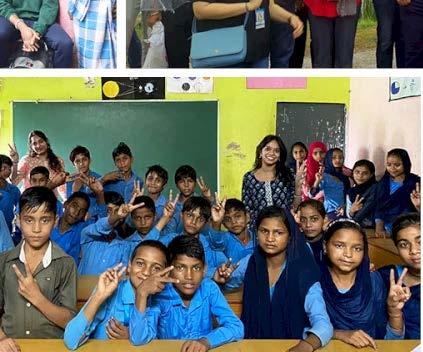
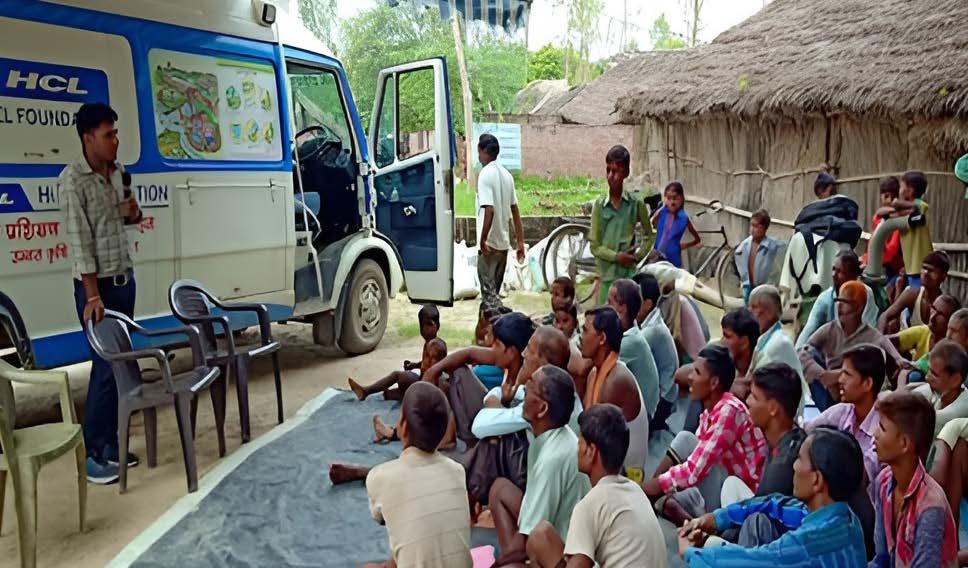
Ronit Ray worked on the Living Looms of India project with Access Development Services. This is a livelihood generation initiative to rejuvenate the domestic Indian Handloom Industry. LLI aims to create employment opportunities for skilled artisans in the handloom sector and train them to become capable and independent of any middlemen. It also seeks to bring the handloom industry back to its former glory by promoting handloom products made in India and produced by the local people.
Vedika Goel worked with CareNidhi on their project with a focus on social education, offering hands-on experience in Developmental sector work in the intersectionality of marginalization (disability-poverty and correlated)
Pawan Kumar worked with HCL- Samuday, which is a flagship rural development programme of HCL Foundation that intends to develop a sustainable, scalable, and replicable model – a source code for economic and social development of rural areas in partnership with state government, local communities, NGOs, knowledge institutions, and allied partners. The program is about designing and implementing optimal interventions across agriculture, education, health, environment, livelihood, and WASH (Water, Sanitation & Hygiene).
Kasi Gagana Chandrika worked with Samatha Vidya Vyavasaya Abhivridhi Samkeshama Sangam (SVVASS) on a project on empowering women through the co-operative banking system: TSMMACTSL. The project focused on providing continuous and qualitative need-based financial services to poor women, encouraging thrift, selfhelp, and mutual aid within the society. It also advocates for women’s rights and gender equality through outreach and empowerment initiatives.
Bhavvini worked with HCL Noida on their project called Uday, a Corporate Social Responsibility program focused on sustainable development and key areas from sustainable development goals, such as building clean and healthy communities and uplifting and empowering people by addressing their well-being through focused intervention.
Sanjit worked with HCL on assessing existing tailoring units for getting fair trade certification and recommendation. The project aimed to empower rural women and support fair trade tailoring centers in the Pudur and Vilathikulam blocks of Thoothukudi, India. Helping these centers achieve Fairtrade certification while gaining valuable experience in ethical fashion and social impact. The work entailed
Nandwani, Bharti, and Punarjit Roychowdhury (2025). “Rural Roads infrastructure and women empowerment in India,” World Bank Economic Review https://doi.org/10.1093/wber/lhae048
Roychowdhury, Punarjit and Aanshi Sharma. “Timely justice in India: Can AI be the answer?” Hindustan Times, April 1, 2025.
Roychowdhury, Punarjit and Aanshi Sharma. “Rich getting richer, poor poorer, as growth turns capital-intensive,” 360info, March 19, 2025; Down to Earth, March 20, 2025; Northeast News, March 22, 2025; Scroll, March 23, 2025.
Dhamija, Gaurav, Punarjit Roychowdhury, and Binay Shankar (2025). “Does Urbanization Empower Women? Evidence from India,” Journal of Population Economics https://link. springer.com/article/10.1007/ s00148-02501085-4
Roychowdhury, Punarjit and Aanshi Sharma. “India Inc.’s profits are growing. So why are your wages still low?” The Indian Express (Digital), February 20, 2025.
developing checklists, preparing training materials, and facilitating certification. The project is seen to make a tangible difference in the lives of local women by increasing economic opportunity and empowerment within the community.
RESEARCH
Dr. Punarjit Roychowdhury, Associate Professor of Economics in the School of Humanities and Social Sciences, has been invited to serve as a Visiting Scholar at the United Nations University World Institute for Development Economics Research (UNU-WIDER) during the summer of 2025. The institute conducts cutting-edge policyrelevant research, capacity-building initiatives, and knowledge dissemination to inform decision-making on pressing global issues such as inequality, poverty, economic transformation, and climate change
Dr. Roychowdhury will examine the long-term effects of early-life exposure to counterinsurgency policy on India’s human capital and labour market outcomes. While the adverse consequences of growing up in conflict zones are well documented, much less is known about how state responses to insurgency shape individual economic trajectories.

Roychowdhury, Punarjit. “Can the budget unlock labour market potential?” Hindustan Times, February 4, 2025. Nandwani, Bharti, and Punarjit Roychowdhury. “Rural road infrastructure empowered women in India,” VoxDev, January 9, 2025.
No Poverty

Contested Childhoods: Caste and Education in Colonial Kerala
Dr. Divya Kannan, Assistant Professor in the School of Humanities and Social Sciences, is the author of Contested Childhoods: Caste and Education in Colonial Kerala (Cambridge University Press).
The book focuses on the interactions between poor, marginalized caste communities and missionary and government educators. The central theme in the book is how formal schooling became increasingly linked to the notion of modern childhood and the potential for improved futures. Missionary schools positioned themselves as providing a “home away from home” for destitute and orphaned children.

However, their methods, which frequently included physical punishment rooted in evangelical beliefs about sin and compounded by imperial ideologies, were not uniformly effective. Records from the Basel Mission reveal significant resistance from the children.
Disease Modelling Laboratory
Samit Bhattacharyya, Associate Professor, Department of Mathematics, heads the Disease Modelling Laboratory. Research projects in the lab employ mathematical models and computational methods to gain a comprehensive understanding of the interactions between the economy, infectious diseases, and human behavior. The projects employ data-driven models to unravel the intricacies inherent in the underlying phenomena. Many projects study cost, disparity, burden, and socioeconomic status and model behavior in poorer regions and countries.
Creative design for sustainability
The Department of Design in the School of Humanities and Social Sciences aspires to become a center of excellence in design education, research, and practice through a future-forward, humancentered, research-driven, and practice-oriented approach. One of the Department’s critical research areas is to reverse past years’ unsustainable trend, where design has primarily contributed to the existing consumerism-based society and socio-economic development. The students and faculty work closely to develop a comprehensive, sustainable design framework and tools for the creative design phase that address occupational issues for economically weaker sections of society.

Redesign of the traditional handloom
Dr. Prakash Kumar, Associate Professor, Department of Design, received a research grant from the Department of Scientific and Industrial Research (DSIR), Government of India, for a project to redesign the traditional handloom. The project aims to address occupational problems associated with traditional handlooms, which make weaving a cumbersome and physically demanding task involving both legs and hands. Redesigning the traditional handloom would increase their efficiency and output, hence the income for the weaver. Another important aspect is that of marginalized weaving communities who cannot buy a new system by discarding the present setup. The project is developing a set of low-cost accessories that can be fitted to existing traditional setups so that, at a very small cost, weavers can increase their efficiency and income at the same time.
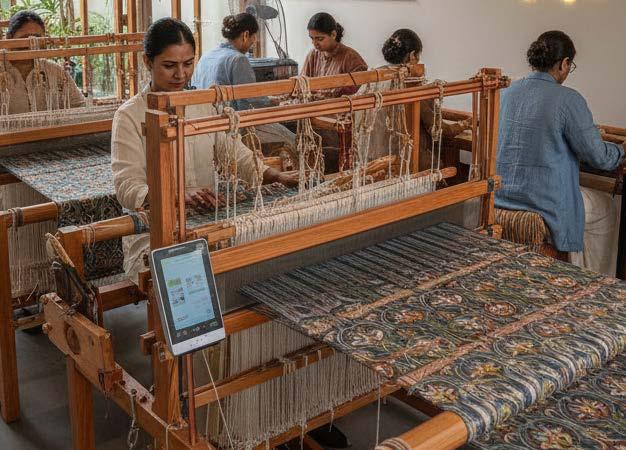
INSTITUTIONAL PRACTICES
Skill development program
Shiv Nadar is committed to providing educational opportunities to everyone, regardless of gender, race, religion, or ethnicity. The University imparts a skill development program that provides critical life skills to the children of the University’s housekeeping staff residing in nearby areas and enhances their prospects for a brighter tomorrow. University faculty and students volunteer to impart classes to these children to improve their computer and language skills.
Besides, the University ensures that there is no child labor across all its contracts and that all labor compliances per government norms are adhered to strictly.
Free meals for students from economically weak backgrounds
The university believes in creating opportunities for deserving students from economically backward areas of rural India. One example is students from VidyaGyan School1 who are from rural India and potential high achievers at par with their urban counterparts. Every year, the university covers the full educational and living expenses and provides free-of-cost meals for high-potential students from economically weak backgrounds. The university also provides food to all its minimum-wage working staff at subsidized rates.
STUDENT-LED INITIATIVES
Feeding India Chapter of Shiv Nadar IoE:
Our university has the only student-run chapter of Feeding India. Passionate about eradicating hunger and reducing food waste on campus, the students work closely with non-government organizations and schools around the university to distribute meals and spread smiles.


Aabhaar Drive – the drive is conducted occasionally to share a plate of gratitude with workers on campus. The students conduct a meal-slip collection drive out of their food money and provide meals for over 350 workers on campus.

Adrika Drive – the club students collaborate with AURA, the education student society of the university, and conduct a drive in partnership with a local non-profit organization, Aadrika. The aim is to deliver educational workshops to kids at Aadrika using fun and knowledge activities, concluding with a delicious, wholesome meal.
Sard-E-Chuski is Feeding India’s flagship event to serve hot tea to the guards on duty on cold winter nights. The drive reaches out to over 100 guards and workers on campus.
No Poverty

Economics Society
The Economics Society of Shiv Nadar University is a student-led organization comprising economics enthusiasts from all disciplines across the university. It is an active space encouraging, facilitating, and organizing events and discussions around society’s economic and socio-economic issues. It provides students a seamless learning opportunity from the faculty, seniors, and peers. The society holds an annual Economics Conclave, Iqtisadiyyat, and hosts students from various universities and colleges of the NCR region. The event is filled with an intellectual exchange of ideas, panel discussions, seminars, paper presentations, and policy-making competitions.
Financial Aid to deserving candidates
The University is committed to helping deserving students so that finance is a smooth process in the educational journey of exceptional students. Based on eligibility criteria, the University offers Financial Aid and Scholarships to students selected for living expenses. It provides free-of-cost meals for high-potential students from economically weak backgrounds. The University also provides food to all its minimum-wage working staff at subsidized rates.
PARTNERSHIPS
Estimation of burden and cost due to river blindness (onchocerciasis) in countries in Sub-Saharan Africa: Model the river blindness disease using the data from South Sudan
Samit Bhattacharyya, Associate Professor, Department of Mathematics, heads the Disease Modelling Laboratory at Shiv Nadar University and has collaborated with the Global Health Institute, University of Antwerp, Belgium. The team is working on Onchocerciasis, also known as “river blindness,” caused by the bite of infected female blackflies (genus Simuliidae) that transmit the parasite Onchocerca volvulus. A high onchocerciasis microfarial load increases the risk to develop epilepsy in children between the ages of 3 and 18 years. In resource-limited settings in Africa where onchocerciasis has been poorly controlled, high
numbers of onchocerciasis-associated epilepsy (OAE) are reported. We use mathematical modeling to predict the impact of onchocerciasis control strategies on the incidence and prevalence of OAE.
Global Research Program on Inequality (GRIP)
GRIP is an interdisciplinary research program dedicated to understanding and addressing rising inequalities in all world regions. Committed to epistemological openness, methodological diversity, and the co-production of knowledge, it seeks to integrate plural traditions, various knowledge discourses, and multiple modes of research.
Dr. Yasmeen Arif, Professor, Department of Sociology, is appointed visiting researcher on the project at Bergen. Dr. Arif has worked with GRIPaffiliated senior researcher Bjørn Enge Bertelsen to address questions on identity and global intellectual labor. Her work with Elina Troscenko on another project addresses Political Protests and New Forms of Citizenship.
Dr. Arif also lectures on Governance and Inequality at the Bergen Summer Research School.
Socio-economic growth, inappropriate use of antibiotics, and burden of drug resistance
Dr. Samit Bhattacharya, Associate Professor, School of Natural Sciences, in collaboration with the Public Health Foundation of India (PHFI), Delhi, researched the socio-economic growth, inappropriate use of antibiotics, and burden of drug resistance to showcase how these three components are related through a self-reinforcing cycle. The study results prove how economic disparities (rich become richer and poor become poorer) diverge as a consequence, and the burden of drug resistance increases.
The emergence of antimicrobial resistance has raised great concern for public health in many lowerincome countries, including India. Socio-economic determinants like poverty, health expenditure, and awareness accelerate this emergence by influencing individuals’ attitudes and healthcare practices such as self-medication. This self-medication practice is highly prevalent in many countries where antibiotics are available without prescriptions. Thus, complex dynamics of drug-resistance driven by the economy,
human behavior, and disease epidemiology pose a serious threat to the community.
Poverty, migration, and ITN are used to control malaria in SSA.
This project is supported by the DAAD / Department of Science and Technology (DST) (2022-2025). Dr. Samit Bhattacharya, Associate Professor, School of Natural Sciences, in collaboration with the University of Heidelberg (Germany), through their research, argues that poor people use the Insecticide Treated Net (ITN) for fishing and fencing to increase daily productivity instead of proper use. ITN is the most effective control used for malaria in sub-Saharan Africa. The project uses a Game-theoretic approach to modeling and estimating the impact of human migration behavior on malaria endemicity in SubSaharan Africa.
Community Initiative through the Community Connect Program
Shiv Nadar University is located in a region called Dadri in Uttar Pradesh. Dadri is a rapidly urbanizing rural region with high socio-economic inequality and low SDG outcomes. The university is deeply committed to positively impacting the region and has assumed a central role in the Dadri Development Project, a transformative initiative convened by the Shiv Nadar Foundation (SNF), a non-governmental organization. The project aims to create a “model sustainable rural community around Shiv Nadar University.” This commitment is shared by the university leadership, staff, and students and is instilled in the core of the University’s academic mission.
The projects include well-considered, need-based interventions with multi-stakeholder engagement, implemented in phases, supported by thorough evidence, and subjected to rigorous monitoring and evaluation. These projects and initiatives focus on education, health care, skill development for employability, social safety, reduced inequalities, nature conservation, agriculture, and promoting sustainable practices. Here is a glimpse of some of our projects in this program.
Shilp Shakti
This initiative empowers women in the neighboring villages by providing them with skills in local businesses such as jewelry making, crochet, and business management.
Community Kitchens
As part of Shiv Nadar University’s Community Connect Program, in collaboration with ACCESS Development Services, women in neighboring villages are trained to operate SHG-led community kitchens, equipping them with essential entrepreneurial skills. The sessions covered savings, credit linkages, budgeting, digital payments, and online food delivery platforms, enabling participants to develop practical kitchen management budget plans. This initiative fosters self-reliance and sustainable growth by emphasizing digital and financial literacy. Through community-driven enterprises, these women are shaping a future of economic independence and grassroots impact.

Education and Skill Development
The university also runs programs to impart key life skills to children of its third-party staff and enhance their prospects for the future.
This multi-faceted program includes well-considered, need-based interventions with multi-stakeholder engagement, implemented in phases, supported by thorough evidence, and subjected to rigorous monitoring and evaluation. These projects focus on education, health care, skill development for employability, social safety, reduced inequalities, nature conservation, and agriculture.

Shiv Nadar Institution of Eminence is fully committed to the UN Sustainable Development Goals (SDGs). We have embraced a four-pronged strategy for SDGs through teaching, research, our core institutional practices, and partnerships.
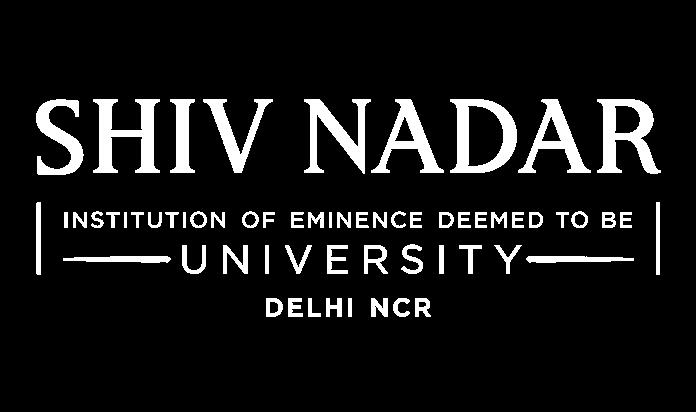
Deepa Hazrati Senior Manager, Office of the Vice-Chancellor deepa.hazrati@snu.edu.in
Shiv Nadar Institution of Eminence Gautam Buddha Nagar, Uttar Pradesh, India
